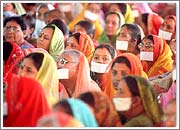Jains celebrate ancient festival in new spirit of environmental care
August 22 2008:
 |
 |
 |
Paryushana celebrations. From surfindia.com |
Whatever their faith, Mumbai residents are this month seeing the environmental effects of a major Jain festival – with the Mumbai Brihanmumbai Municipal Corporation deciding to close down all city slaughter houses during the nine day period.
The Jain festival of Paryushan Parva – which runs from August 27 to September 3 this year - is increasingly being seen as a festival of reflection on our actions to the natural environment, and the consequences of that. It is marked by observing the cardinal virtues of forgiveness, charity, simplicity, contentment, truthfulness, self-restraint, fasting, detachment, humility and continence.
Elsewhere too, it is the occasion of a Jain call to action and reflection of the environment, with Jain believers around the world urged this August and September to promote Jain values, and help work towards environmental sustainability.
“Lord Mahavira preached about the environment in the first book of Acharanga Sutra,” writes RP Chandaria, Chairman of the Institute of Jainology, in a letter sent out to as many members of the Jain community around the world as possible.
“The elements of nature were described as living beings and under the fundamental principle of Ahimsa these were to be protected in all ways – no waste, no overuse, no abuse, no polluting. If we follow these principles then we would stop destroying our environment as well as preserving the resources that are available for all to share. If there are more resources available for all, then the poor will also get a fairer share therof,” he writes,
 |
 |
 |
Lord Bahubali, who renounced worldly goods, and spent so long meditating in nature that he did not notice vines growing around his body. |
The letter continues to encourage readers to “be the change” through either skipping an extra meal, switching off lights earlier or sponsoring a child in India. “By following any one or all of the alternatives, we would have done a service to all living beings and thus implemented the fundamental Jain way of living.”
Jains say that Lord Mahavir – who lived in the 5th century BC – was the first environmentalist of this era – prescribing three key precepts of non-violence, pluralism, and a non-possessive attitude (avoiding accumulation).
Paryushan Parva is traditionally a time of fasting, of clearing, of looking at one’s own misdeeds, and purifying one’s soul. Through forgetting about the needs of the body, it is hoped that believers will be able to concentrate on their inner selves. “Parva” means “auspicious day”, while “Paryushan” combines notions of suppressing appetites with notions of getting closer to one’s soul.
Jains are vegetarians, and Jain monks and nuns care so much for the non-killing of life that they gently sweep the paths before them, so as not to step, accidentally, on an ant.
Links
Link here for the Jain statement about the environment.
Link here to learn more about the Jain attitude to the environment.
Link here for the UK-based Institute of Jainology.
Link here for a speech on Ahimsa and the Environment given by Dr Harshad Sanghrajka at the House of Commons in November 2006.
|

